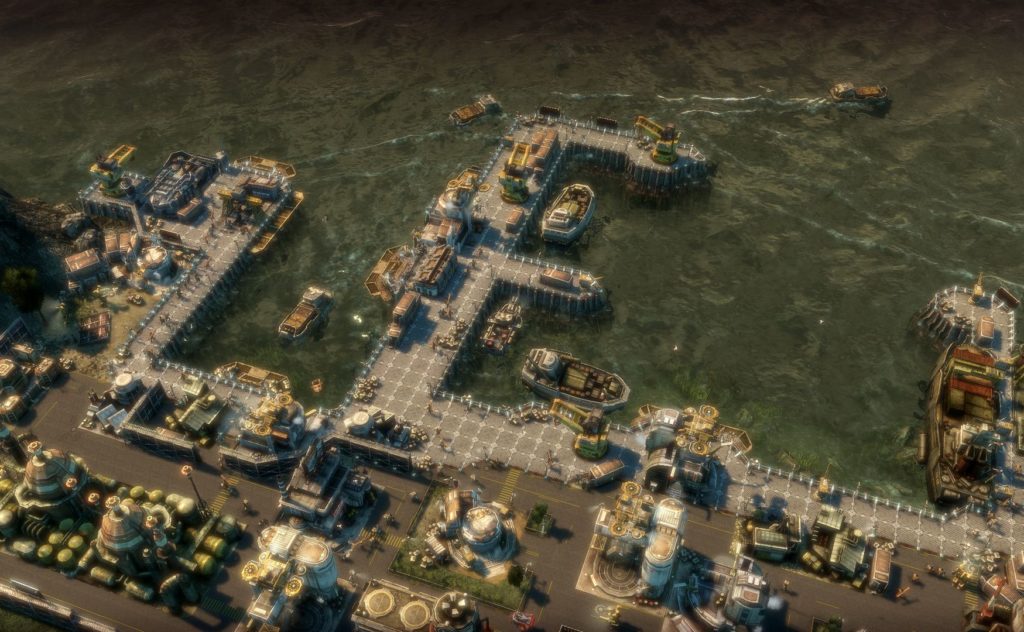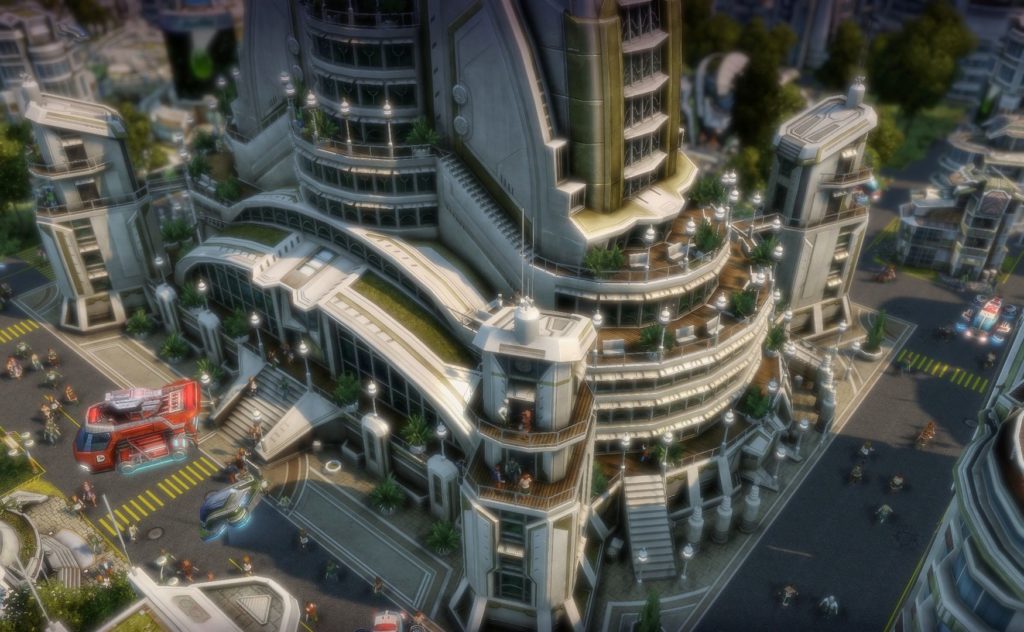Although its title places it almost 60 years in the future, Anno 2070 is very much a game for our present historical moment. It takes place in a world ravaged by climate change. Rising sea levels have altogether drowned many low-lying countries, completely changing the face of global politics.
The central conflict is between the Eden Initiative, known as ‘the Ecos’, and Global Trust, ‘the Tycoons’. While the (tree-hugging, tea-drinking, hemp-wearing) Ecos attempt to alter humanity’s destruction of the environment, reduce pollution, and live sustainably, the Tycoons prefer to stay the course and let human industry and innovation drive us into a richer (if somewhat smoggier and flooded) tomorrow.
So Anno 2070 is a game of binaries. Sustainable development versus the corporate industrial behemoth. Harvesting and manufacturing versus exploring and trading. Real-time strategy versus city-building. …I assume this also explains why I had to accept the license agreement twice.
Across the new archipelagos of an increasingly oceanic world, you will be required to settle, build homes, farms, mines, and eventually factories, service industries, et cetera. Eventually, you can expand into defenses for your cities and naval forces; however, unlike most RTS titles, Anno 2070 largely focuses away from war. In fact, battle barely registers in the early campaign.
Instead, despite looking like an RTS, the game starts off with strong RPG elements. This is not necessarily a good thing: the future seems to be rather too full of fetching and following quests for my liking. If you persevere, though, you’ll be rewarded with increasingly complex tasks to complete for various different parties and thus gradually learn how to put together a working city.
Working city? Perhaps I should have said working base. The game certainly handles much more like StarCraft than Sim City. This is an advantage when you’re sailing off and finding new islands (although why you need to find anything in an age of satellites and flying machines is beyond me), but not so much when you’re building. Devotees of the Anno series may take exception, but I find it rather clunky for a city-builder.

The urban planning aspect isn’t aided much by the visuals. While buildings look suitably futuristic, they are rarely realistic and never iconic. Not only is there little aesthetic pleasure to be gained from looking at the cityscape, it is also often difficult to tell which buildings are which.
The Eco and Tycoon factions are at least easily distinguishable from one another, diverging between pretty naturally-coloured sunlit colonies darker urban sci-fi complexes of steel and concrete. Underwater exploration and building does provide a very cool visual change as well — one which is curiously free of the ‘fog of war’ (which makes certain early missions rather easier than I think was intended).
What Anno 2070 does have over many its competitors, both city-building and RTS, is a connected economy. The game adds to its melting pot of genre a very generous dose of trading game. However, instead of merely going from location to location buying low and selling high, you are in a position to harvest your own resources for sale. Moreover, as your infrastructure grows, you can develop secondary industries and create further products either for export or to enhance the development of your own little empire.
Also, complain though I do about fetch quests, the benefit of this RPG style is a more than fair dose of story. The dialogue isn’t fantastic, but the voice-actors do their job well. The campaign, though short and, for the most part, a bit too easy, serves as a very effective tutorial — one that’s entertaining enough to not have everyone simply want to skip ahead and struggle through learning ‘on the job’.

In addition to teaching the necessary skills to effectively play the game, the campaign also introduces the key factions and their gameplay differences. One of the key differences revolves around pollution: the Ecos can create less of it by living in harmony with the environment; however, unlike the Ecos, the Tycoons benefit from their citizens not caring that about the smog, the sewage, and the leaning tower of garbage in the adjacent lot.
While I’m happy to praise the game’s willingness to engage in these eco-political issues (that are, it must be said, pretty important things to consider right now), there’s also a part of me that’s disappointed by fact that industry and the environment must still be set up in direct competition, rather than encouraging players to find a natural balance.
One might hope for this from the third faction, S.A.A.T. (the Scientific Academy for Advanced Technologies), but unfortunately they are far too busy creating awesomely creepy intelligent robots and running them for office. (Yes, you did read that right.)
So, you might ask: if the campaign is just a means, then what is the end? As with many strategy titles, the main event in Anno 2070 is its open play, in which those for whom the series resonates can expect to lose hours, days, and even weeks.

Anno 2070 also puts a lot of emphasis on its online experience, which plays out both in terms of multiplayer matches and content evolving over time through updates (new missions have already been added!) and the interactions of a global community. It is an awesome idea, but I can’t help feeling that it is somehow connected to the amount of time spent patching every time I start up and how I am sometimes locked out of the game altogether…
It is one of a number of frustrating blemishes in what is generally a well put-together game. Ultimately, though, it is Anno 2070’s hybridized gameplay that is both its biggest draw and its biggest drawback.
For the strategy gamers who love base-building rather than raiding and for the keen traders who want to settle down and establish a port and a merchant navy, I can imagine little better: Anno strikes a very interesting balance that you won’t find elsewhere, and it should provide a lot of gameplay hours.
However, it may prove too clumsy for some city-builders and there will certainly be RTS warmongers turned off by the lack of battle. It’s a good game, it just isn’t for everyone.